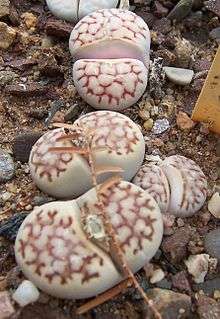Lithops karasmontana
| Lithops karasmontana | |
|---|---|
 | |
| L. karasmontana, Cologne University Botanical Collection | |
| Scientific classification | |
| Kingdom: | Plantae |
| (unranked): | Angiosperms |
| (unranked): | Eudicots |
| (unranked): | Core eudicots |
| Order: | Caryophyllales |
| Family: | Aizoaceae |
| Subfamily: | Ruschioideae |
| Tribe: | Ruschiae |
| Genus: | Lithops |
| Species: | L. karasmontana |
| Binomial name | |
| Lithops karasmontana N.E.Br. | |
Lithops karasmontana (Karas Mountains living stone) is a species of flowering plant in the ice plant family Aizoaceae, native to Namibia and South Africa (the name refers to the Great Karas Mountains of Namibia).
Description
It is a clump-forming succulent growing to 4 cm (2 in) high and spreading indefinitely. The almost stemless leaves appear in pairs, and resemble two grey stones with brown mottling on the flat surfaces. White, narrow-rayed flowers 3–4 cm (1–2 in) in diameter, appear in autumn.[1]
L. karasmontana resists attacks from herbivorous predators by mimicking the local stone formations, in this case quartzite. When not in flower it is extremely difficult to detect.[2]
Cultivation
In temperate regions it must be grown in heat under glass, in conditions similar to those for cactuses. Like all Lithops, it requires extremely well-drained soil.
Like all Lithops it also grows in annual cycles, as the leaf-pairs flower, and then each produces a new leaf-pair that replaces the old one (which shrivels away). The principal rule of watering is that Lithops should be kept dry from when they finish flowering, up until the old leaf-pairs are fully replaced. It has gained the Royal Horticultural Society's Award of Garden Merit[3]
| Wikimedia Commons has media related to Lithops karasmontana. |
References
- ↑ RHS A-Z encyclopedia of garden plants. United Kingdom: Dorling Kindersley. 2008. p. 1136. ISBN 1405332964.
- ↑ "Cactus Art - Lithops karasmontana 'Opalina'". Retrieved 26 June 2013.
- ↑ "RHS Plant Selector - Lithops karasmontana". Retrieved 26 June 2013.